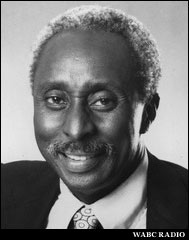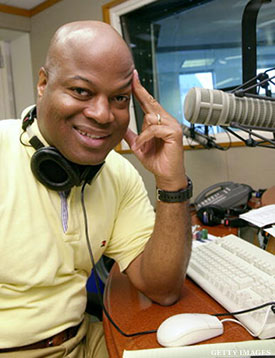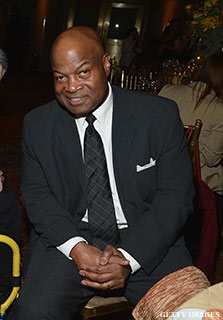WFAN in New York launched on July 1, 1987, as the nation's first 24-hour, all-sports radio station. In Imus, Mike and the Mad Dog & Doris from Rego Park: The Groundbreaking History of WFAN, author Tim Sullivan recounts the Fan's first quarter-century of history, which includes stories about the station's most compelling personalities. He also looks at the role of two pioneering radio hosts, Art Rust Jr. and Dave Sims, whose work on other stations had helped make all-sports radio a viable idea.
Art Rust Jr. never made it to the Fan, but he had an influence on a good number of hosts who did. Rust, a New York native born in Harlem, held numerous roles across many platforms in the Big Apple, but the one that stands out, the one that inspired so many others, was his gig as the host of a little radio show in the early 1980s called Sportstalk.
Rust, a grizzled veteran of print, television, and radio, attacked many a sports topic on the pioneer of a show for WABC. There was no WFAN back in 1981, obviously, and the doomed project that was Enterprise Radio was scuffling to find its way over in the rolling hills of Connecticut. For a good long while in the sports radio stratosphere, there was Rust ... and that was it.
WABC, 770 on your AM dial, was nowhere near an all-sports format at the time. That wasn't even on its radar. It was a Top 40 station in 1981, playing the likes of "Bette Davis Eyes" by Kim Carnes, "Jessie's Girl" by Rick Springfield, and "I Love a Rainy Night" by Eddie Rabbitt.
Who needs sports radio when you've got Eddie Rabbitt? On crystal-clear AM no less?
Well, in 1982, the station ditched the hits and changed its format. Plenty of news. Plenty of talk. And just a little touch of sports. Which is where Rust, an African American who died in 2010 at the age of 82, upped his profile, filling some time talking Mets, Yankees, Giants, Jets, Knicks, and Nets with the people of the city. For that time period, it worked. It wasn’t spectacular radio, but it was different, if nothing else. And many took notice.
Dave Sims was one of them. Himself an African American working as a sportswriter at the New York Daily News, Sims enjoyed Rust’s opinions, appreciated the insight, and was honored to often be an on-air guest.

"I listened to Art a lot when I was at the Daily News, and I don’t remember how the heck we met. But then the next thing I know, I was on there a lot, and I loved it. Lot of fun," Sims said with a laugh and smile that is seen at every baseball game he broadcasts now for the Seattle Mariners, among other on-air gigs. "I was the first black sportswriter at the Daily News, and there haven't been a heck of a lot after me. But that was pretty cool to do that [with Art]. It was like being with an uncle for me because Art’s reference points were a carbon copy of my old man's. So we hit it off really well."
Along the way, Sims, a Philadelphia native who was still easing his way into life some 90 miles up the road in the Big Apple, found that he was pretty good on the air himself -- opinionated, thorough, and funny. And soon enough, others noticed. Halfway through the decade, WNBC, which took residence at 660 AM before the switch to WFAN, hired the affable Sims and gave him his own time slot. SportsNight was a call-in show that crossed five hours, spanned the globe of sports, and ran right up against, yep, Art Rust Jr.
"I went from frequent guest on Art's show to having a show going against him, so that was a riot," Sims said, chuckling. "And the fact that we had two black guys, one a generation older, was great. Art had to be a good 20 years older than I am, but it was an interesting generation span, having two black guys in New York City on 50,000-watt blowtorches talking sports. I thought that was huge. I don't think anybody's said a lot about that. But given where this country is and where it came from, we always thought that was pretty damn significant. It was a lot of fun."

So, as listeners and callers alike began to warm toward Sims' solo act, he seemed like a perfect fit for The Fan, the empire still under construction. It seemed like a matter of time before his wit and wisdom found a new home, and in the 1990s, he finally did. Sims was hired for a show with partner Ed Coleman.
It was to be the midday show, the dreaded 10:00 AM to 1:00 PM hole after Imus in the Morning and before Mike and the Mad Dog. It was a tough spot to be in, attempting to bridge the gap between the station’s two tent poles. People weren’t driving to work at that time, as they were during Imus. And people weren’t driving home from work at that time, like they were during Francesa and Russo. The midday was kinda just ... there.
But Sims had already overcome a lot in his day. What was another challenge to a guy like him? Like Rust, Sims was persistent, passionate, and proud. In other words, he was perfect for tackling that midday melancholy.
"We just wanted to put on a quality program,” Sims said simply.
And they did.
The show was named The Coleman and the Soul Man, and the pair was fair with callers, booked plenty of guests, and shared many a laugh along the way. In a Bermuda Triangle of a time slot, Coleman and Sims swam along with the swirling tides just fine.
The Coleman and the Soul Man was a different type of program, and that was par for the course in terms of WFAN's approach to the midday. You have to stand out, you always have to be thinking ahead. And regardless of the management team in place during different eras of The Fan, none of them ever threw their hands up and gave up on that time slot. There was always something new, something bold, to try.

None bigger than two out-of-towners trying to make a midday dent in the media capital of the world.
"In retrospect, I learned they wanted me to be the ugly black man, the angry black man, and Eddie was going to be the cool and calm guy from Boston. They figured there’d be sparks flying! The white, Irish guy from Boston, and a black guy from Philly! ‘This is going to be combustible.' Turns out, we hit it off beautifully,” Sims said proudly. “We dug each other immediately. A lot of people said it created boring radio, but I said it was great conversational radio. That was one of the beauties of The Fan: If you wanted sparks and confrontation and this, that, and the other thing, in terms of explosiveness, you had Mike and Chris later on. But Eddie and I, for the most part, we got along great."
Coleman, with as many laughs as Sims had in his response, concurred.
"It's funny, I’ve always thought of Philly and Boston as big towns. And New York is a city. To me, there aren’t that many cities. Boston was very much a big town. Philly is kind of the same way. Dave always looked at it that way and we hit it off, based on that,” Coleman said. “It was a lot of fun working with him. And we agreed with a lot of our hits and misses."
There's always going to be a few of the latter.

"We had a show at [the now-closed] Mickey Mantle's [Restaurant] that we loved doing down there [in Manhattan]. One of my idols in sports -- and I think Dave's, too -- has always been Willie Mays. So we’re fortunate enough one time at Mickey Mantle's to have him on the show ... and he couldn't have been more of a jerk that day," Coleman added, laughing in retrospect. "If he's not in the mood to do something that day, you know it and we knew it. But it's funny, when Willie left near the end of the show, Dave and I looked at each other and said, 'I can't believe how much of an asshole he was.'"
Coleman later recalled a warmer story about meeting up with Mays in San Francisco, when the former was on assignment covering the Mets for WFAN in 1996. Coleman had to fly home unexpectedly after hearing the news of his mother’s death from cancer, some two years after he lost his father. As Coleman was waiting for the taxi to take him to the airport, he was greeted by Mays.
"Willie came out and spent about 15 minutes with me until the cab came, just talking about life, about his parents. It was great. I saw another side of him at that point and realized that's why I liked him so much as a ballplayer," Coleman said. "I always thought Willie was the best all-around ballplayer I ever saw. I grew up watching Ted Williams. And as a kid, when Ted Williams was playing, he was the greatest hitter I ever saw. I was a Red Sox fan growing up, but Willie was the best all-around player I ever saw.

"I just thought it was funny. Dave and I were both kind of surprised at that interview. I thought it was going to be a really good time. And it was like the worst of all. Turns out, he was just probably having a bad day. But it goes back to us being on the same page. Dave and I were just like that."
"I think we had one significant argument about [former Mets manager] Davey Johnson," Sims said. "I thought Davey Johnson could change his stripes and he didn't think so. We got into a long and what turned out to be an extraordinarily stupid debate about whether or not he could change coming off a couple poor seasons before he got fired. It was entertaining, if nothing else."
And that’s what the midday show has been for years at The Fan. Long-lasting? No. Headline-grabbing? Not always. Revenue-generating? Eh. But always entertaining, always unique, and always forward thinking.
-- Excerpted by permission from Imus, Mike and the Mad Dog & Doris from Rego Park: The Groundbreaking History of WFAN by Tim Sullivan. Copyright (c) 2013 by Tim Sullivan. Published by Triumph Books. All rights reserved. No part of this excerpt may be reproduced or reprinted without permission in writing from the publisher. Available for purchase from the publisher, Amazon, Barnes & Noble and iTunes.





